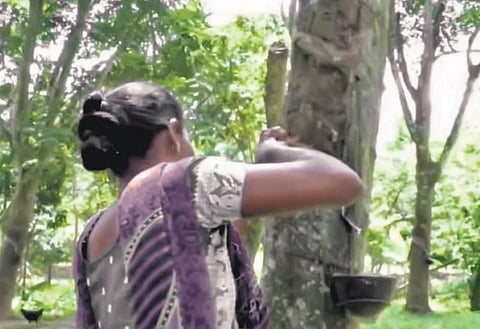

THIRUVANANTHAPURAM: The Union government may not have a magic wand to resolve the plight of rubber farmers, as the Syro-Malabar Church thinks. World Trade Organization (WTO) and ASEAN agreements, and global financial markets, all play a major role in influencing their fortunes.
Thalassery Archbishop Mar Joseph Pamplany’s statement that if the Union government raised the rubber price to Rs 300/kg the church would help the BJP in elections has not gone down well with the political fronts in the state.
Moreover, according to economists and farmers’ associations, aside from the political implication of the bishop’s statement, the rubber sector is facing a grievous situation.
“The situation has been very grim for nearly two decades,” former planning board member Dr K N Harilal told TNIE.
“Natural rubber has been one of the growth engines of Kerala since 1960. The Gulf boom came later. The growth of the sector lifted many families out of poverty. It gave lakhs of farmers' income, jobs to labourers and foreign exchange to the country.
However, the picture changed after India became a party to WTO and Asean agreements. Families migrated from many villages.
These were reported from Seethathode and Ranni in the 2006-11 period, he said. Even if the church promised three MPs instead of one, the Union government would not be able to raise the rubber price to `300, Harilal added.
The WTO has classified rubber as an industrial raw material and not an agricultural product. So, the issue of import duty does not arise.
“The issue stems from the introduction of rubber as a mono-crop and the large-scale subsidy in Kerala and other states,” a political analyst said. “In the period of globalisation, laws are changed based on global supply. As a party to WTO and Asean agreements, India cannot make any decision that would have repercussions on the global market,” he said.
Nearly 5.56 lakh hectares are under rubber cultivation in Kerala. The demographic changes in central Kerala have also had an impact on rubber farming. The new, educated generation is migrating to foreign countries. And there is a shortage of people remaining in farming.
‘Has value of gold'
The collapse in prices has forced many farmers to stop farming, and tapping. Some had replaced rubber with other crops. “Earlier, when the price was high the sheets of rubber kept in our house had the value of gold,” Biju, a farmer from Thiruvananthapuram, told TNIE.
“In any urgency, we would borrow money from our neighbours. The next day we could repay by selling the sheets,” he said.